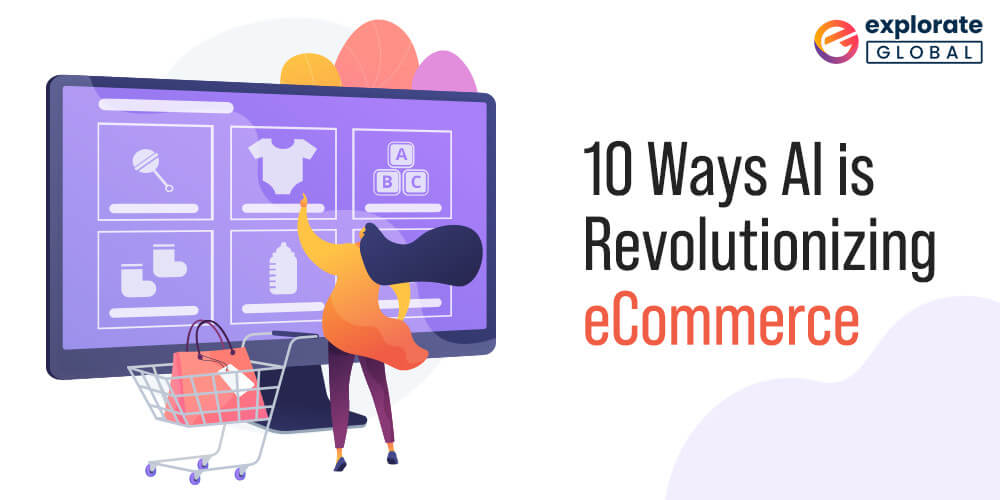
Artificial Intelligence is starting to embed itself into all phases of our lives. It is just about everywhere, from the increasing number of self-checkout cash registers to advanced security checks at the airport. It’s widely expected that Artificial Intelligence is all set to go into turbo drive in the next few years, as giants of the digital market like Google and Microsoft are already investing heavily into new AI initiatives. Google has recently purchased a start-up DeepMind for £400m – an artificial intelligence company that specializes in algorithms and machine learning for a positive impression, it is just one of many predictable acquisitions as the potential of such technology becoming a reality. In fact, one of the latest studies suggests that around 85% of customer communications will be managed without a human by the end of 2022.
The internet has unlocked the door for transforming various sectors, the eCommerce sector is one of them. eCommerce AI have opened new scope and opportunities for retailers and they have never seen such progress in their sales. Artificial intelligence is now taking E-commerce to the next level. E-commerce marketplaces are leveraging the development of Artificial Intelligence to help customers with greater experiences and making things easier for various operations. The global returns from artificial intelligence will touch $36 billion by 2025. It is all because of the involvement of Artificial Intelligence in eCommerce including UX that directly impacts Search Engine Optimization.
The comprehensive Artificial Intelligence applications in eCommerce development allow businesses to grow their revenues by enhancing and automating decision-making, right from website design to customer support. Several eCommerce businesses are already using forms of AI to better comprehend their customers, generate new leads, and provide a better customer experience. eCommerce AI helps online businesses to recognize patterns from unstructured data sets and allows them to offer a modified experience. Here’s how eCommerce AI is empowering the industries all over the world.
How eCommerce AI is Empowering Online Retail Businesses?
1. eCommerce AI Optimizes Warehouse Operations

Amazon has above 175 contentment centers worldwide, where loads of orders are daily picked, packed, and shipped to the respective buyers, in which 100,000 flat, wheeled robots provide services to move and arrange packages. These robots make sure that products that can be grouped together are placed close to each other for easy packing.
Computer Vision Systems evaluate images to help securely track where everything is positioned as explained by Russell Allgor – the chief scientist for Worldwide Operations at Amazon. This info is then used to minimize the distance robots have to travel and decision logic and AI optimizations are used to make those decisions in real-time with new orders added every single second. Machine Learning is very helpful to calculate how long it takes for an order to move from point A to point B. This is how artificial intelligence is helping eCommerce aggregators, to deliver orders in just one day and even the same day for some locations.
2. eCommerce AI’s Image recognition helps in product discovery
Several eCommerce companies are quickly adopting this technology. Myntra, a leading fashion e-commerce company in India also offers an image search feature combined with voice search to its customers. Customers can even upload pictures from their mobile galleries and the app displays products or the relevant matches identified in the image. Amazon has also added a similar feature called StyleSnap, which gives smart recommendations after evaluating a picture uploaded by a customer. Users need to simply upload photos of fashion looks and the app returns search results that match the items in the image like fashion accessory or apparel, etc. Deep learning and computer vision in the background makes it possible for the algorithms to discover sub-categories of items like color, fabric, fabric patterns, etc.
An image recognition technology is also being used by Alibaba, called Virtual Fitting Rooms. The feature, accessible on Taobao/Tmall app, gives virtual renders of customers wearing the particular fashion items after they upload a photograph of themselves. Supported by deep learning and natural language processing, Tmall Smart Selection helps customers with modified recommendations. It also interacts with retailers and suggests them to increase inventory for particular products to stay equipped for increasing demand. Understanding the customer’s behavior Artificial Intelligence helps e-commerce marketplaces to make things easier for the end-users and provide a perfect degree of personalization.
3. eCommerce AI Provides a Personal Touch with Chatbots

The adoption of Chatbots is increasing continuously, and customers are becoming more comfortable communicating with Chatbots. As per Business Insider, about 38% of people have positive views about Chatbots. Almost every popular e-commerce marketplaces have taken on Chatbots to reduce the workload on the support teams. However, the use of Chatbots isn’t just limited to simplification of the support load, they are also helpful to drive sales. As per the recent study by DigitasLBi about 1 in 3 Americans are all set to buy products with the help of a chatbot. Customers are using Chatbots to receive product recommendations, trending product info, existing or future discounts, etc.
Natural Language Processing, a subfield of AI, is formative to Chatbots in which Natural Language Understanding (NLU) is used to comprehend the input given by a user, and Natural Language Generation (NLG) is used to create a response that is both helpful and natural-sounding. Combined with home automation and Virtual Agents and Assistants, it’s getting relaxed for people to purchase online using Chatbots. This trend will simply increase, and Chatbots will continue to assist this AI-powered e-commerce marketplace in a big way.
4. eCommerce AI Retargets Potential Customers
Most of the businesses are now overloaded with unmanageable and uncontrollable customer data that they do little or nothing with. For example, if you take a deeper look at the retail industry, facial recognition technology is already being used to catch shoplifters by scanning their faces with CCTV cameras. But how can eCommerce AI be used and implemented to improve a customer’s shopping experience? Well, some businesses are now using facial recognition to capture customer stay time in the physical store. This means that if a customer spends a noteworthy amount of time next to any particular product, then this information will be stored for use upon their next visit to the store.
As Artificial Intelligence develops, you can anticipate special offers and deals on customer’s computer screens based on their in-store dwell time. The look of sales is changing with businesses responding straight to the customer. It is like businesses are reading the minds of potential customers and it’s all thanks to the data used with AI.
5. eCommerce AI Creates More Efficient Sales Process
Customer’s lives these days are deeply influenced by several different media from TV adverts to social media. If you want to modify your problem-solving solutions and generate a solid sales message that reaches users at the right time on the right platform, then integrating AI into your CRM is the way to go. Various eCommerce AI systems allow natural language learning and voice input such as Alexa or Siri. This permits a CRM system to answer customer queries, resolve their issues and even recognize new opportunities for the sales team. Some AI-driven CRM systems can even multitask to handle all these purposes.
There is slight uncertainty that AI is already starting to affect e-commerce and has started to grow the sales process with new data. The changes will make sure that customers will no longer be offered products and services that are unsuitable. eCommerce AI is making extensive changes to the approach businesses deal with their customers, gaining faster access to data and harnessing employees’ talent for better use.
You Might Like The Growing Role of Artificial Intelligence in Business
6. eCommerce AI Creates New Level of Personalization Across Multiple Devices
Personalization is not anything new for eCommerce and if you regularly use Amazon then you’ll know exactly what we’re talking about. With the ever-increasing signs of progress in artificial intelligence and machine learning development, new deep levels of personalization have started to enter the fast-growing e-commerce world. While AI-based personalization for eCommerce takes the multi-channel method. New AI engines, such as Boomtrain, sit on top of the many customer touchpoints to support the business analyze how customers are interacting online.
Whether it is a mobile application, an email campaign, or a website, the AI engine is constantly monitoring all devices and channels to build a universal customer opinion. This integrated customer view allows eCommerce retailers to provide a seamless customer experience across all platforms. The next time a customer is searching the iPhone charger on your website, they may get a push notification on their mobile, updating them about your flash sale for iPhone chargers. They directly purchase as per their requirement, saving a lot of steps for both parties.
7. eCommerce AI Improves Recommendations for Customers

Using eCommerce AI, brands can more logically and efficiently scan through a lot of data to predict customer behavior, and provide related and useful suggestions to individual consumers. This level of approach is essential in providing a modified shopping experience for the consumer. The eCommerce AI has transformed the way a customer shops in our mobile world. Various eCommerce businesses want to bring the best of an offline shopping experience to the online space, by providing customers a smooth way to find products they are vigorously looking for. There is the main emphasis on ‘hyper personalization’, which could only be eased by learning genuine consumer behavior and making predictions with huge amounts of data that is gathered from user activities on smartphones, desktops, and tablets.
The procedure of recommendation is extensively practiced by eCommerce retailers to assist customers to find the finest solution. For example, Amazon makes recommendations to consumers subject to their activities on the site and any earlier purchases. Netflix makes Movies and TV Series recommendations based on a consumer’s interaction with categories like comedy, drama, and action. And this continues to progress with numerous variations in place. eCommerce AI is already being put to decent use in offering personalized recommendations to subscribers based on their likings and we expect this to cultivate rapidly within the next year.
8. eCommerce AI Builds an Assorted Intelligence Tool
Customers are pushing retailers to change their pricing policies. As a result, multichannel retailers must apply flexibility when it comes to their price structuring, for them to keep hold of customers. Retailers are simplifying an extraordinary level of 24/7 visibility and valuable insights into competitors’ product assortments. This smart tool then delivers businesses with the ability to swiftly adjust their product-mix and pricing with high precision. A remarkable competitive benefit that offers complete visibility into what products are being offered in the market. The clever software puts retailers in a solid position to make particular assortment and planning resolutions, and track the business impact of those activities.
9. eCommerce AI Generates Sales Through Wearable Technology
We all know the vital role that mobile plays in e-commerce sales. In fact, as per Shopify, 2016 saw mobile overtake other channels as the main source of eCommerce traffic. For instance, products such as the Apple Watch, FitBit, and other forms of wearable technology come into the eCommerce AI market, the implications for eCommerce retailers are abundant. So, why is wearable technology beneficial for eCommerce platforms? Because wearables have the inspiring skill to gather data beyond just what eCommerce platforms do today. Wearable technology can see what products you view, describe your taste, and can promptly recommend personalized products.
If you start to add in physical data such as vital statistics, pupil dilation rate and measurements, the level to which recommendations could be personalized is truly unbelievable. Amazon Go already promises to transform a customer’s shopping experience by creating it cashless. The customers no longer require to take out their wallets with wearables, it’s the key to a checkout-less shopping experience. AI-powered eCommerce will be at the core of any further development as retailers boost the user experience with customer data. Progressive eCommerce retailers will certainly want to construct new partnerships with the best AI technology to stay in touch with their rising global customer base.
10. eCommerce AI Improves Dialogue System
Amazon has started to apply AI to extensively well-known issues with dialogue structures, such as speech recognition, natural language understanding, and question answering. For example, by applying a class of Artificial Intelligence and machine learning algorithms known as deep learning, Amazon can efficiently convert speech (spoken by customers) to text with exact results. They are also tackling the problem of answering questions automatically using AI by leveraging content within website pages such as product descriptions and customer reviews and ratings. For instance, a customer may ask ‘What is the processor in this particular laptop or desktop?’ A more compound question would comprise ‘Which TV out of these two has superior image quality?’ An eCommerce AI is offering new chances and prospects for retailers to engage with customers.
Conclusion
Artificial Intelligence in eCommerce is transforming aggregator platforms into their innovative and smarter versions, leading to the progress of these platforms in extraordinary ways. Artificial Intelligence in eCommerce holds the power to expand the performance of websites and progressive retailers are using the technology to great effect. Online retailers are connecting AI’s predictive abilities to develop healthy relationships with customers by personalizing user experiences, thus generating repeat business.
For many businesses, Artificial Intelligence in eCommerce provides an undeniable competitive advantage and it will soon turn out to be a part of everyday business and those that integrate it within their operations will stay in front. AI technology is expected to have a vast and valuable impact on the eCommerce industry in the coming years and it will change and expand the way consumers find products online.


3 thoughts on “10 Ways AI is Revolutionizing eCommerce”